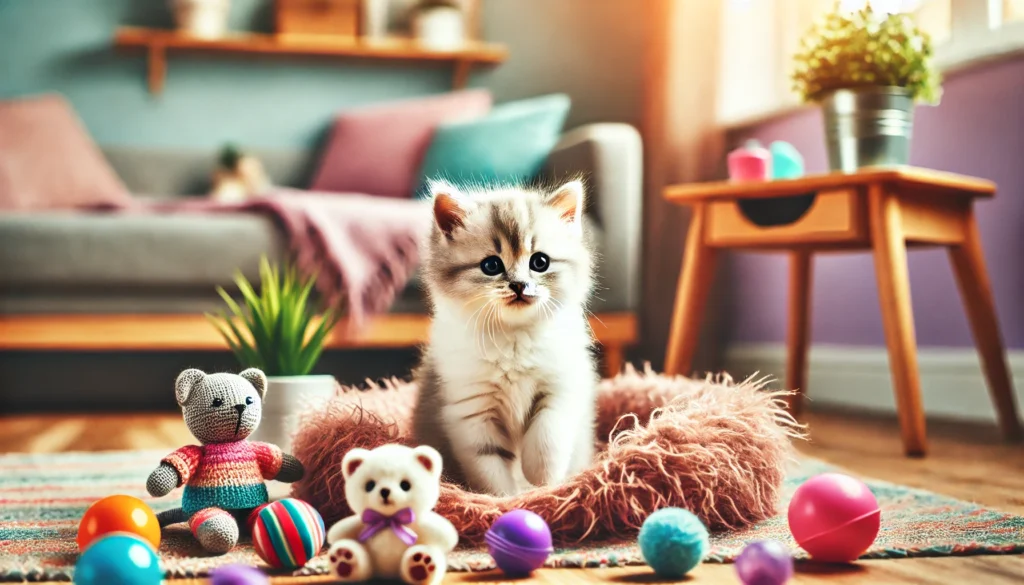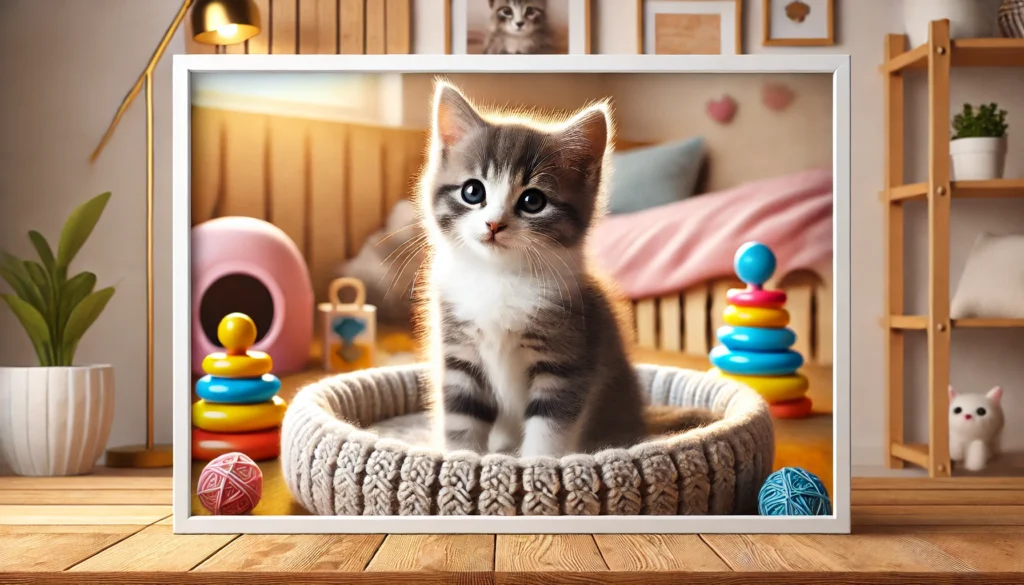Caring for a kitten can be one of the most rewarding and challenging experiences in an animal lover's life. These small felines require attention, affection and specific care to remain healthy and happy. If you've just adopted a kitten, it's essential to know the best practices to ensure he has everything he needs. In this article, as a specialist veterinarian, I will share 10 essential tips for caring for a kitten that will help you provide the best start in life for your new friend.
Preparing the Environment for the New Cat
Firstly, before bringing a kitten home, it is crucial to prepare the environment properly. This means ensuring the space is safe and comfortable for the puppy. Remove small objects he can swallow, hide electrical wires, and create a space where he can hide and feel safe. Additionally, invest in a cozy bed and some toys so he can entertain himself and feel welcomed.
An extra tip is to consider using synthetic pheromones. These products can help reduce your puppy's stress as they adapt to their new home, providing a more peaceful and welcoming environment. Also place scratching posts in strategic places so that he can exercise and wear down his nails, avoiding damage to the furniture.
Proper Nutrition for Kittens
Nutrition is one of the most important aspects of caring for a kitten. Therefore, offer a high-quality food specifically for puppies, rich in proteins and essential nutrients for growth. Don't hesitate to consult your veterinarian for recommendations on the best brands and types of food. Additionally, always keep fresh, clean water available for your pup.
Puppies have high energy needs, and food must be divided into several small meals throughout the day. This helps maintain constant energy levels and promotes healthy growth. Avoid offering foods for human consumption, as many can be toxic to cats, such as chocolate, onions and garlic.
Veterinarian Visits and Vaccinations
As soon as you adopt a kitten, schedule a vet visit. The first appointments are essential to ensure that your puppy is healthy and to start the vaccination schedule. Vaccinations are vital for protecting your cat against serious illnesses. Additionally, your veterinarian can advise on deworming and other necessary preventative care.
Deworming is especially important in the first few months of life, as puppies are highly susceptible to intestinal parasites. Your veterinarian will prescribe an appropriate protocol to ensure the elimination of worms and prevent reinfestations. Additionally, your veterinarian can discuss the importance of routine exams and how to monitor your pup's health over time.
Socialization and Initial Training
Socialization is a critical aspect of a kitten's development. From an early age, expose him to different people, sounds and environments so that he becomes a confident and sociable cat. Additionally, begin initial litter box training and, if possible, teach basic commands. Patience and consistency are key during this phase.
During socialization, it is important to introduce the puppy to other people and, if possible, other pets in a controlled and positive way. This will help reduce fear and anxiety in the future. Play with him regularly to encourage mental and physical development, and use positive reinforcements, such as treats and praise, to encourage desirable behaviors.

Importance of Play and Physical Activity
Kittens have a lot of energy and need activities to develop physically and mentally. Therefore, invest in interactive toys that encourage hunting and exploration. Playing regularly with your puppy not only helps burn off energy but also strengthens the bond between you.
A variety of toys is essential to keep your puppy interested. Toys like feathered wands, balls and tunnels are great for encouraging physical activity. Additionally, intelligence games, which challenge your kitten to solve problems to earn rewards, are excellent for stimulating your kitten's developing brain.
Hygiene and Hair Care
Maintaining your puppy's hygiene is crucial to his health and well-being. Brush the coat regularly to prevent the formation of knots and hairballs. Additionally, introduce tooth brushing from an early age to prevent future problems. Baths are not often necessary, but if necessary, use specific products for cats.
Kittens are naturally curious and can get dirty easily. Although cats are very clean and groom themselves, an occasional bath may be necessary. Always use suitable products and avoid excessively wetting your head. Regular ear cleaning and nail trimming are equally important to maintain your pup's overall hygiene.
Adaptation to the Use of the Litter Box
Teaching your puppy to use the litter box is an important part of training. Place the crate in a quiet place and show the puppy where it is. Initially, you may need to place the puppy in the crate a few times so that he understands its purpose. Keep the box clean to encourage regular use.
The choice of sand is also a crucial factor. Some cats prefer fine-textured litter, while others may adapt better to grainy options. Try different types of sand until you find what your pup likes best. Remember to clean the box daily to avoid odors and maintain a pleasant environment for your cat.

Recognition and Prevention of Common Diseases
Kittens are susceptible to a number of diseases, so keep an eye out for signs of health problems. Loss of appetite, lethargy and changes in behavior are indications that something may be wrong. Consult your veterinarian if you notice any unusual symptoms.
In addition to vaccines, disease prevention also involves keeping the environment clean and avoiding contact between the puppy and unfamiliar animals that could transmit infections. Vaccination against diseases such as panleukopenia, rhinotracheitis and calicivirus is essential to protect your puppy's health. Early neutering can also prevent behavioral problems and some diseases.
Importance of Microchip and Identification
Considering microchipping is an important safety measure for your pup. If he gets lost, microchip identification can help bring him back home. Additionally, a collar with an ID tag can be helpful, but make sure it is secure and comfortable for the pup.
A microchip is a permanent form of identification that cannot be lost, like collars. It is a quick and simple procedure performed by the veterinarian. Also, keep your contact details up to date in the microchip registry to ensure you can be found if your cat becomes lost.
Preparation for Adulthood
Finally, preparing for your cat's adulthood is essential. This includes considering spaying or neutering, which can prevent unwanted behaviors and health problems. Continuing to offer a balanced diet, providing stimulation and ensuring regular visits to the veterinarian are practices that must be maintained throughout your cat's life.
The transition from puppy to adult food should be done gradually to avoid digestive problems. Continue to encourage physical activity and environmental enrichment to keep your cat healthy and happy. Regular veterinary appointments are essential to monitor your cat's health and prevent possible problems.
Conclusion
Taking care of a kitten is a journey full of tender moments and learning. With the essential tips mentioned in this article, you will be well prepared to provide the best possible care for your new feline friend. Remember, each kitten is unique and may require specific care, but with love, attention and dedication, you will be on your way to raising a healthy and happy cat.
